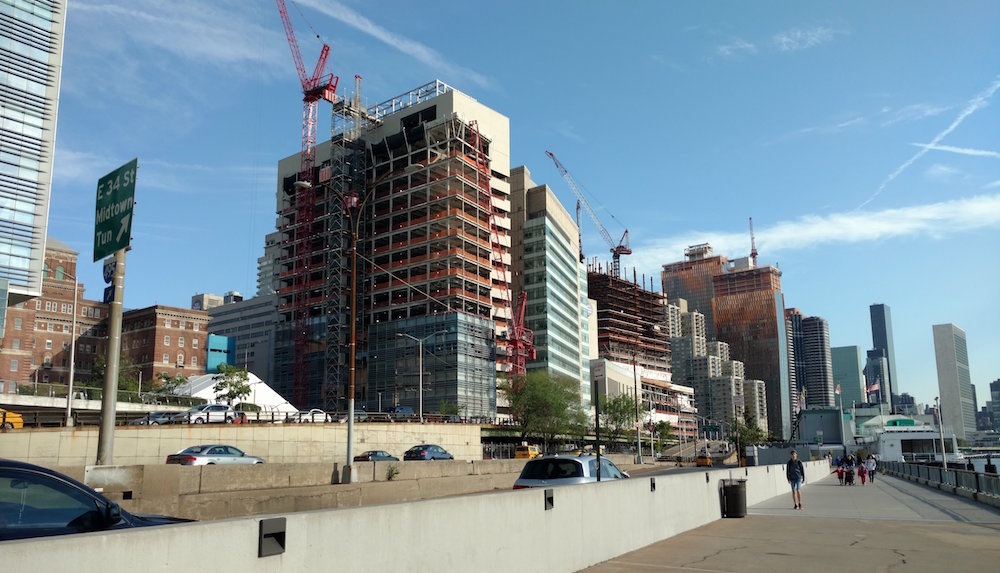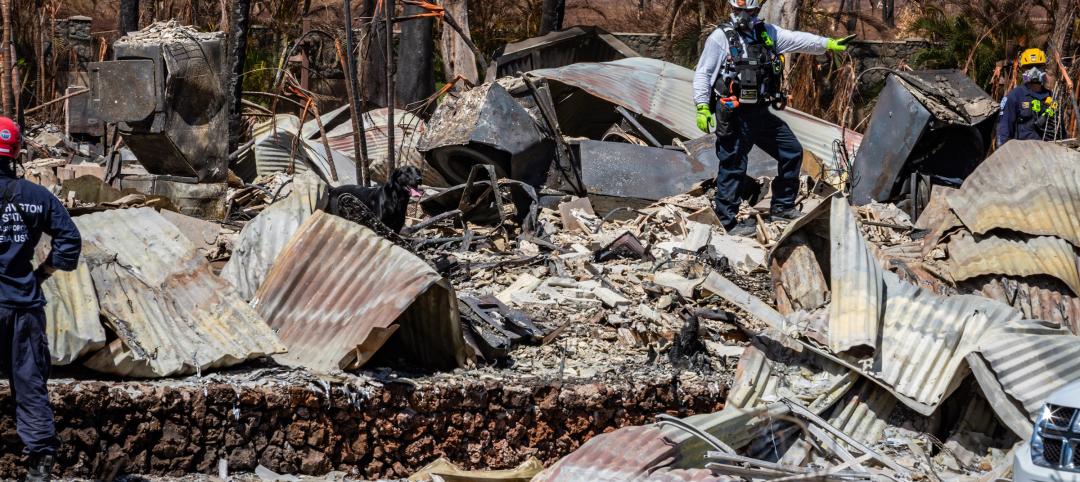The American Institute of Architects (AIA), National Institute of Building Sciences (NIBS) and 38 other leaders of America’s design and construction industry, released a report this week on progress made on the resilience front since the Resilience Building Coalition announced the Building Industry Statement on Resilience two years ago.
The Resilience Building Coalition also released a set of guiding principles to help the building industry adopt resilient design and policies. These include developing and advocating for codes and policies that advance resilience; developing “whole-systems resilient design” approaches for the built environment; and providing guidance, beyond the baseline life-safety codes, that recognizes the importance of fortifying property for individual and community resilience. Since the initial signing, the Coalition has added 19 new signatories, listed below.
The report includes results from a survey of signatories about how their work has been impacted by the Building Industry Statement on Resilience. Among the survey’s major findings:
- A majority of signatories report that they have “become more aware of their unique role in achieving resilience” since committing to the statement, which has clearly catalyzed the integration of resilience goals into existing organizational frameworks.
- Almost 30% of respondents have seen an increase in resilience as a priority within their organizations.
- More than two-thirds of respondents listed high-performance buildings as an initiative they were most interested in advancing.
- More than half of the responding signatories have used the Statement to “advance their organizational mission statement/values,” as well as “provide support and/or validation for moving forward on organization initiatives.” This shift in organizational priorities has led to concrete action.
- Respondents reported more than 40 initiatives they have begun that support the resilience focus areas committed to in the Statement.
The report is an outgrowth of a landmark agreement made in May 2014, in which leaders of America’s design and construction industry agreed to promote resilience in contemporary planning, building materials, design, construction and operational techniques as the solution for making the nation’s aging infrastructure more safe and secure.
“Resilient design places architects at the center of the solution, with particular emphasis on the private, non-governmental sectors," said American Institute of Architects CEO Robert Ivy, FAIA. “I would like to congratulate my fellow leaders in the design and construction sector for joining together to make sure resiliency is not viewed as just a fad but remains front and center in our efforts moving forward.”
The list of organizations that have signed the joint statement on resilience is as follows (new organizations are marked with an asterisk):
- The Air Barrier Association of America*
- American Council of Engineering Companies
- American Institute of Architects
- American Planning Association
- American Society of Civil Engineers
- American Society of Interior Designers
- American Society of Landscape Architects
- American Society of Plumbing Engineers
- American Wood Council*
- ASHRAE
- Associated Builders and Contractors
- Associated General Contractors of America
- BuildStrong Coalition*
- Building Owners and Managers Association
- Congress for New Urbanism*
- Concrete Reinforcing Steel Institute*
- Construction Specifications Institute*
- EcoDistricts*
- Federal Alliance for Safe Homes*
- Green Building Initiative*
- Illuminating Engineering Society*
- Insurance Institute for Business & Home Safety*
- International Association of Plumbing and Mechanical Officials*
- International Code Council
- International Facility Management Association
- International Interior Design Association
- Lean Construction Institute
- National Association of Home Builders
- National Association of Mutual Insurance Companies*
- National Concrete Masonry Association*
- National Fire Protection Association*
- National Institute of Building Sciences
- National Insulation Association*
- National Ready Mixed Concrete Association*
- National Society of Professional Engineers
- Portland Cement Association*
- Royal Institution of Chartered Surveyors
- US Green Building Council
- U.S. Resiliency Council*
- Urban Land Institute
Related Stories
Urban Planning | Oct 12, 2023
Top 10 'future-ready' cities
With rising climate dilemmas, breakthroughs in technology, and aging infrastructure, the needs of our cities cannot be solved with a single silver bullet. This Point2 report compared the country's top cities over a variety of metrics.
Building Materials | Oct 2, 2023
Purdue engineers develop intelligent architected materials
Purdue University civil engineers have developed innovative materials that can dissipate energy caused by various physical stresses without sustaining permanent damage.
Resiliency | Sep 25, 2023
National Institute of Building Sciences, Fannie Mae release roadmap for resilience
The National Institute of Building Sciences and Fannie Mae have released the Resilience Incentivization Roadmap 2.0. The document is intended to guide mitigation investment to prepare for and respond to natural disasters.
Codes and Standards | Sep 25, 2023
Modern codes, construction techniques saved structures in Maui wildfire
Modern building codes and construction techniques were effective in saving buildings from the devastating wildfire in Maui on August 9th, according to a recent report, IBHS Early Insights Lahaina Fire—2023, from the Insurance Institute for Business and Home Safety’s research division.
Mass Timber | Sep 19, 2023
Five Things Construction Specialties Learned from Shaking a 10-Story Building
Construction Specialties (CS) is the only manufacturer in the market that can claim its modular stair system can withstand 100 earthquakes. Thanks to extensive practical testing conducted this spring at the University of California San Diego (UCSD) on the tallest building ever to be seismically tested, CS has identified five significant insights that will impact all future research and development in stair solutions.
Engineers | Sep 15, 2023
NIST investigation of Champlain Towers South collapse indicates no sinkhole
Investigators from the National Institute of Standards and Technology (NIST) say they have found no evidence of underground voids on the site of the Champlain Towers South collapse, according to a new NIST report. The team of investigators have studied the site’s subsurface conditions to determine if sinkholes or excessive settling of the pile foundations might have caused the collapse.
Resiliency | Sep 11, 2023
FEMA names first communities for targeted assistance on hazards resilience
FEMA recently unveiled the initial designation of 483 census tracts that will be eligible for increased federal support to boost resilience to natural hazards and extreme weather. The action was the result of bipartisan legislation, the Community Disaster Resilience Zones Act of 2022. The law aims to help localities most at risk from the impacts of climate change to build resilience to natural hazards.
Metals | Sep 11, 2023
Best practices guide for air leakage testing for metal building systems released
The Metal Building Manufacturers Association (MBMA) released a new guidebook, Metal Building Systems - Best Practices to Comply with Whole-Building Air Leakage Testing Requirements.
Codes and Standards | Aug 31, 2023
Community-led effort aims to prevent flooding in Chicago metro region
RainReady Calumet Corridor project favors solutions that use natural and low-impact projects such as rain gardens, bioswales, natural detention basins, green alleys, and permeable pavers, to reduce the risk of damaging floods.
Sustainability | Aug 15, 2023
Carbon management platform offers free carbon emissions assessment for NYC buildings
nZero, developer of a real-time carbon accounting and management platform, is offering free carbon emissions assessments for buildings in New York City. The offer is intended to help building owners prepare for the city’s upcoming Local Law 97 reporting requirements and compliance. This law will soon assess monetary fines for buildings with emissions that are in non-compliance.
















